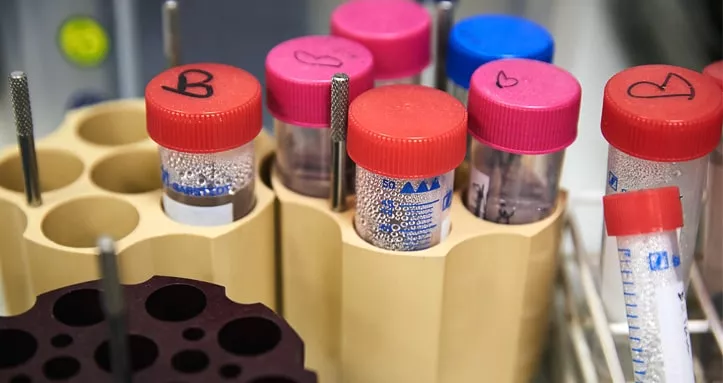
Type 1 diabetes can develop in babies under six months old and the immune attack behind the condition may begin before they’re born, a new study funded by us has suggested for the first time.
Until recently, it was thought babies under six months could only develop neonatal diabetes, which is caused by a genetic change affecting insulin-producing beta cells in the pancreas, and not type 1 diabetes, where the same cells are destroyed by an immune system attack. As people with neonatal and type 1 diabetes need different treatments, it’s incredibly important they get the correct diagnosis.
An early attack from the immune system in type 1
In research published today, our research fellow, Dr Richard Oram, studied a group of children who had developed diabetes before six months, but who didn’t have any of the genetic mutations known to cause neonatal diabetes. His team wanted to find out if the children in fact had type 1 diabetes.
They compared 166 of these children to a group of children with confirmed neonatal diabetes and a third group who were diagnosed with type 1 diabetes at an older age (6-24 months). The team studied their genes and immune system, and looked at how much insulin the children could produce on their own.
They found that children diagnosed under six months without confirmed neonatal diabetes had a higher genetic risk of type 1 diabetes, more autoantibodies (molecules in the blood that signal an immune attack on beta cells) and lower insulin-producing capacity, than children with neonatal diabetes. They concluded that this combination points to the existence of type 1 diabetes in children under six months. It’s the first time an autoimmune condition that isn’t caused by a single genetic change has been seen in children this young.
The research team also discovered that children with this very early onset type 1 diabetes had a lower than average birth weight - and the earlier they developed type 1 diabetes, the lower their weight. Whereas, those diagnosed after six months were born at a normal weight. This suggests low-birth weight was only a specific feature of very early onset type 1 diabetes.
Usually a foetus begins making insulin in the womb, helping them to grow. These new findings raise the question of whether the immune attack behind type 1 diabetes could start before birth in some babies, leading to reduced insulin production and consequently lower birth weight. This challenges scientists’ current understanding of the immune system in early life.
What happens next?
The researchers now want to study this rare form of very early onset type 1 diabetes in more detail, to understand how it might be possible for the immune system to go rogue before it’s fully formed.
Dr Richard Oram, Diabetes UK researcher at the University of Exeter, said:
“This study proves that type 1 diabetes can present in the first few months of life, and in a tiny subset of infants may even begin before birth. We also found that diabetes diagnosed so young was associated with rapid progression to complete destruction of insulin producing beta cells.
The next phases of this work, where we study the immune system in more detail, will hopefully help explain how it is possible for type 1 diabetes to develop so early and whether these insights could open up new ways to prevent or treat the condition in the future.”
Dr Elizabeth Robertson, our Director of Research, said:
“By revealing for the first time the existence of type 1 diabetes in the very first few months of life, these important findings rewrite our understanding of when the condition can strike and when the immune system can start to go wrong.
We now need to piece together how and why type 1 diabetes can develop at such a young age. This could also unlock crucial insights into causes of type 1 diabetes more generally, in people of all ages, and will be essential to develop treatments that stop or prevent this life-altering condition in babies.”
